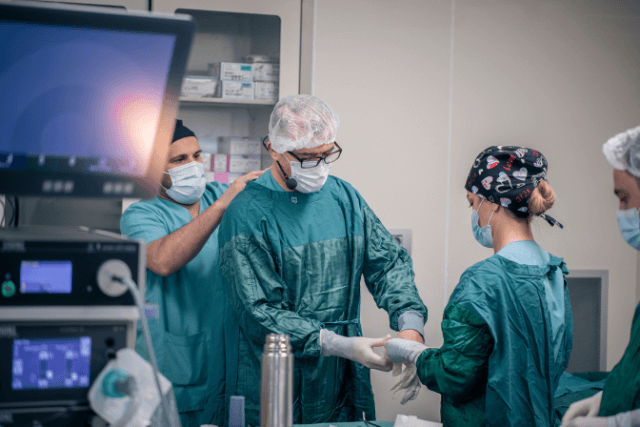The recent popularity of GLP-1 medications such as Ozempic®, Wegovy®, and Mounjaro® has brought new hope to millions struggling with obesity. These injectable medications mimic natural gut hormones to reduce appetite and slow digestion leading to moderate weight loss for many users.
However, while GLP-1s play an important role in weight management, bariatric surgery remains the most effective and durable treatment for obesity. At IBI Clinic, our mission is to help patients understand the facts and to choose the option that offers the best long-term health outcomes.
Bariatric Surgery vs. GLP-1: The Difference in Weight Loss Outcomes
GLP-1 medications typically lead to 15–20% total body weight loss when used continuously. While this is a meaningful improvement, most patients regain some weight after stopping the medication often within months.
In contrast, bariatric surgery (such as gastric bypass, sleeve gastrectomy, or SASI bypass) results in 60–80% excess weight loss on average, with long-term durability that far surpasses any medication-based therapy.
Evidence Snapshot:
- The STAMPEDE Trial (NEJM, 2017) showed bariatric surgery achieved three times greater sustained weight loss and diabetes remission compared to medical therapy alone.
- A 2023 JAMA meta-analysis confirmed that surgical patients maintained significantly more weight loss at 10 years than those treated with medications.
Impact on Metabolic Health
Bariatric surgery is metabolically active. In fact, it doesn’t just restrict calories; it resets hormonal signals, improves insulin sensitivity, and alters gut hormone production.
As a result, patients often experience:
- Diabetes remission
- Lower blood pressure and cholesterol
- Improved sleep apnea and mobility
- Enhanced fertility and quality of life
Meanwhile, GLP-1 medications can mimic some of these effects, but they rarely achieve full metabolic normalization and require indefinite use to sustain results.
Long-Term Results and Cost-Effectiveness
GLP-1 medications work only as long as you stay on them. Once discontinued, most patients regain 50–70% of lost weight within a year. Additionally, the monthly cost of GLP-1 therapy ($1,000–$1,500) can quickly exceed the one-time cost of a bariatric procedure.
By contrast, bariatric surgery provides lifelong metabolic improvement and can be more cost-effective over time with proven reductions in diabetes medications, cardiovascular risk, and hospitalizations.
The Complete Care Model at IBI Clinic
At IBI Clinic, we combine the power of surgery with modern metabolic medicine. Our comprehensive approach may include:
- GLP-1 therapy pre- or post-surgery when appropriate
- Endoscopic and revision procedures for prior patients
- Nutritional and behavioral support for lifelong success
Our goal isn’t just weight loss — it’s lasting health transformation.
Bariatric Surgery vs. GLP-1: Conclusion
GLP-1 medications are valuable tools — but bariatric surgery remains the gold standard for achieving and maintaining significant, sustainable weight loss.
If you’ve struggled with obesity or weight regain despite medication, contact IBI Clinic today to explore advanced surgical and non-surgical options tailored to your needs.
References
Schauer PR, et al. N Engl J Med. 2017;376:641–651.
Courcoulas AP, et al. JAMA. 2023;329(7):558–569.
Wilding JPH, et al. N Engl J Med. 2021;384:989–1002.
American Society for Metabolic and Bariatric Surgery (ASMBS). 2023 Clinical Guidelines.
Rubino F, et al. Lancet Diabetes Endocrinol. 2022;10(9):627–640.










